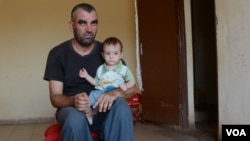Another door may be closing for Syrians fleeing the conflict in their country, this time in Africa. Mauritania was one of the last countries allowing free entry to Syrians. But in February, it too began demanding visas as officials in North Africa and the Sahel try to stem the flow of migrants and refugees traveling across the Sahara in hopes of reaching Europe.
Jamal Ahmed calls his friend Khalid on What's App. “Where are you now?” he asks him.
Both men are from the Syrian town of Idlib. Khalid has just arrived in Germany. Jamal remains in Bamako where the men and their families shared a stuffy apartment for two years.
Jamal never intended to stay in Mali this long.
He says the heat and constant electricity cuts are hard. He says his six children keep getting sick. His baby, Mohamed, is ten months old but weighs just five kilos and has had several bouts of malaria. If I had the money, he says, we would leave in 24 hours.
But he’s afraid of what would happen if his children got sick traveling in cramped smugglers' trucks across northern Mali and Algeria.
That’s the route his friend Khalid took to the European enclave of Melilla, a Spanish city on the coast of northern Morocco. From there, he took a boat to Spain.
It's a long, hot, roundabout journey but one that was growing in popularity last year as eastern European nations were shutting their borders.
If they had the money, Syrians could board a plane in Turkey or Lebanon and fly the 5,000 kilometers to Mauritania's capital.
From Nouakchott, they can take a bus to Mali. Smugglers can then take them along the ancient desert salt roads to the Mediterranean. It’s a dangerous route African migrants have used for years. It costs about $300 per person.
Dozens die doing it every month, though officials say Syrians tend to have more cash and have thus fared better.
Between January and April of this year, the U.N. refugee agency in Mali says it counted 436 Syrian refugees passing through one small border town headed in the direction of Timbuktu.
Bakary Doumbia of the International Organization for Migration (IOM) in Bamako, says it’s hard to know how many Syrians in all have come to Mali.
“You will see the father, the mother and kids all moving together," said Doumbia. "The first group that came through in September, the 36 [people], they all had passports and transit visas. The others, we don’t know because they are not coming through [urban areas]. Generally they try to avoid major towns and go through desert lands.”
The U.N. says it has seen a tenfold increase in Syrians requesting asylum in Mauritania since last year, when Algeria began demanding visas.
Fewer Syrians are arriving in Nouakchott now, as Mauritania began demanding visas two months ago.
Mali has granted 92 Syrians refugee status this year. But that doesn’t allow them to work, and jobs are scarce anyway.
Jamal says staying in Mali long-term is not an option.
He says school fees are expensive, yet the level of education is much lower than in Syria. My oldest son wants to be a doctor, he says. In Syria, he was among the best in his class. Here he struggles to keep up because he is still learning French.
Jamal says thoughts of Germany keep him awake at night.




